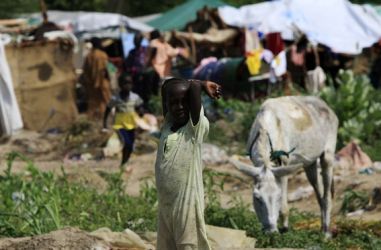Limited funds, time hindering north-south repatriation: IOM
By Julius N. Uma
October 13, 2011 (AWEIL) – Attempts to relocate South Sudanese from north Sudan to newly independent South Sudan are facing serious financial setbacks and time constraints, the International Organization for Migration (IOM) acknowledged in its latest media briefing.

The ongoing north-south operation, it adds, brings to nearly 7,000, the total number of people who have so far been repatriated since the country’s July 9 independence, courtesy of funds provided by the Common Humanitarian Fund (CHF).
“The convoy, consisting of six luggage barges and two double-decker passenger barges, left Kosti on 18th September and follows an earlier CHF-funded IOM movement of about 7,000 people, which was completed in early April,” IOM’s October 11 statement partly reads.
In the briefing, however, IOM’s Claire Bolt expresses great concerns over the fate of about 11,000 southerners, who reportedly remain at Kosti as well as thousands said to be waiting in Khartoum for help.
“Many of these people have been waiting for months and have run out of money. Time is also running out. We have some funding from the UN to pay for more movements, but this is only a fraction of what is needed to move all the Southerners who want to leave Sudan before the expiry of the 9-month interim period,” Bolt says.
After independence on July 9 the Khartoum government gave Southern Sudanese a nine month window to leave the country or apply for citizenship which they are unlikely to get. Many northern Sudanese, especially in the government, feel that South Sudan’s overwhelming vote for independence constitutes a rejection of the north and therefore they should leave.
South Sudan’s plebiscite on independence was part of a peace deal ending decades of civil war, which caused millions to flee into north Sudan and neighbouring countries.
Violence in Blue Nile and South Kordofan, states in north Sudan that share a border with South Sudan have hindered returns over land. Groups from the two areas fought with South Sudan against Khartoum but have refused to disarm after the peace deal period expired, as key elements have yet to be implemented.
The IOM also cites the deliberate closure of roads linking the two regions, which cuts off commercial ties, as some of the issues hindering repatriation process. Persistent rains have also been a contributing factor.
“Journeys to final destinations within the South have also been hampered by rain and large numbers of Southern Sudanese arriving by bus have been stranded in three IOM-supported transit camps in Renk, pending their onward transportation,” the organisation says.
On October 5, however, IOM reportedly signed a new agreement signed with the national internally displaced persons center within the Sudanese ministry of humanitarian affairs, in a move that will, in the coming months, assists another 12,000 South Sudanese to travel by train from the North to Aweil, the Northern Bahr el Ghazal capital and Wau, the Western Bahr el Ghazal capital.
The agreement, funded by the UN Central Emergency Fund (CERF), will reportedly target people camped out and waiting for transport at departure points around Khartoum, some of them since last November.
Around 3,700 are camped by Shajara train station waiting for board the 1,300-kilometre train journey to, South Sudan’s north western region. of Bahr el Ghazal. The ministry of humanitarian affairs committed itself recently to ensuring the safety of the 1,500 people expected to be on each train convoy as they travel through the troubled state of South Kordofan. In June returnees were killed in a attack on a train heading south.
AFP reported recently that the IOM intends to “repatriate 18,000 southerners, two-thirds of them by rail and the rest by river,” over the next three months. The first train was due to leave Shajara in the next week or so.
Meanwhile, the IOM remains optimistic that the CERF funding will enable the organisation help an additional 6,000 people to travel by barge from Kosti southwards with a Sudanese company helping with logistics. Also underway, the organization says, are special arrangements to fly the vulnerable unable to cope with the barge or train journey from north to south.
Since October 2010 at least 360,000 people have returned to South Sudan from the north. Of those people 14,000 have travelled by barge from Kosti since January.
(ST)

john c malow
Limited funds, time hindering north-south repatriation: IOM
many southerers are still in the north currently the sudan as foreign country. their being in the north is because of no way for them to repatriate to south and their belonging properties. so i ask the RSS and IOM to take this issue seriosely before the 9 month expire